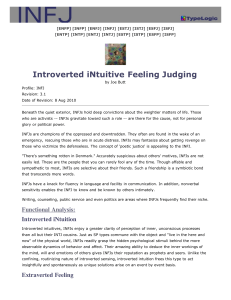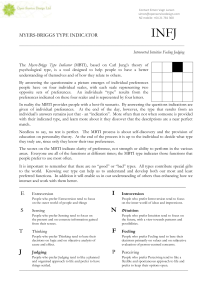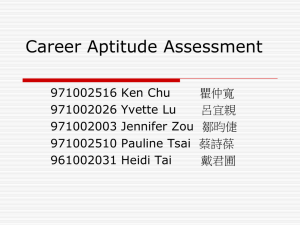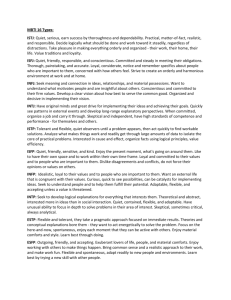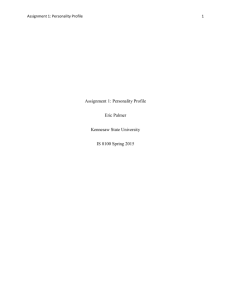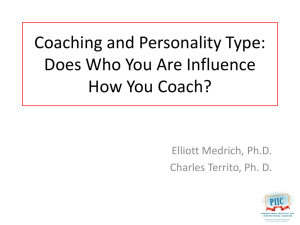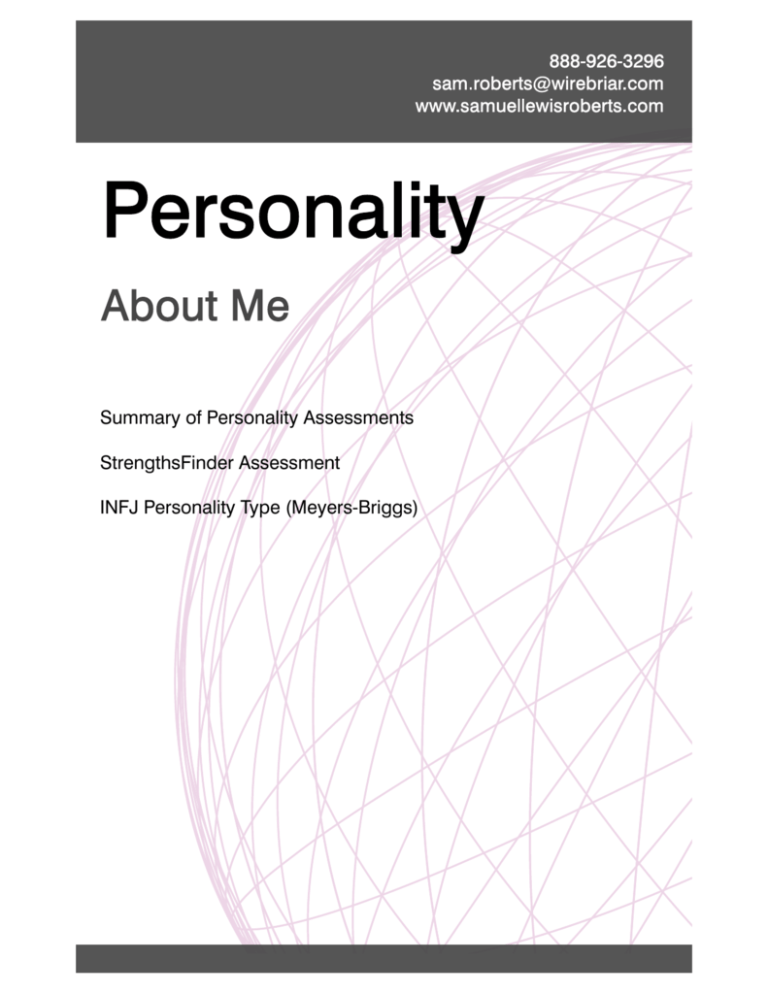
Summary of Personality Assessments
StrengthsFinder Assessment
INFJ Personality Type (Meyers-Briggs)
About Me
My first major in college was Social Work. All my career testing said I would make a
great therapist, because I have an innate ability to intuit into other people (in fact, I can’t
not intuit). My brother is a play therapist that works with children, and sometimes I’m
jealous (although it is very difficult to make a living as a therapist).
I’m a good listener and care about people’s feelings, but I’m not afraid to call people on
things when they’re out of line. I’m also good at setting boundaries, which is a key to
healthy relationships between any two entities.
From the Meyers-Briggs test, I came out as an INFJ, the rarest of personality types. See
http://www.thetalentjungle.com/bba/infj.htm for an overview.
My DiSC personality test results said I am somewhat of a dichotomy: “On the surface,
you may seem to have a contradictory nature. For example, you often display great
sensitivity, but you may not hesitate to show an aggressive side to get what you want.” I
am high in “C” conscientiousness, and actually “D” dominance was a little bit higher; I
was DC, and my profile name was “Creative”.
Another personality test I took was called “The Color Code”. They tested to see what
combination of the four colors I was: yellow for fun loving, white for steady & accepting,
red for leadership & dominance, and blue for caring & empowering. I was exactly
red/blue with almost no yellow and white. Which means I’m not very fun (I don’t party
enough) and I also don’t enjoy taking it easy or watching TV too much (white). I prefer
leading the pioneer party at the front and following up the rear to help people fainting by
the wayside (which is actually impossible to do, so it makes things interesting!) It’s a
constant dichotomy inside of me that they say creates compassionate leadership.
Gallop has a website called http://www.strengthfinder.com that goes along with the book
“Next, Discover Your Strengths” (the book that followed, “First Break All the Rules”).
The website tests your strengths in 34 areas—even strengths that are often portrayed as
weaknesses (such as being a naysayer, competitive, anal, etc.) My #1 strength at
strengthsfinder.com is “Strategic”, followed by Intellection, Ideation, Achiever, &
Responsibility.
Samuel L. Roberts
Strategic
Intellection
Ideation
Achiever
Responsibility
Copyright 2000 The Gallup Organization. All rights reserved. StrengthsFinder® is a trademark of The Gallup Organization.
S T RE N G T HS F I ND E R
®
T HE GAL L UP O R G A N I ZATION
Samuel L. Roberts
Strategic
The Strategic theme enables you to sort through the clutter and find the best route. It is not a skill that can
be taught. It is a distinct way of thinking, a special perspective on the world at large. This perspective
allows you to see patterns where others simply see complexity. Mindful of these patterns, you play out
alternative scenarios, always asking, "What if this happened? Okay, well what if this happened?" This
recurring question helps you see around the next corner. There you can evaluate accurately the potential
obstacles. Guided by where you see each path leading, you start to make selections. You discard the
paths that lead nowhere. You discard the paths that lead straight into resistance. You discard the paths
that lead into a fog of confusion. You cull and make selections until you arrive at the chosen path−your
strategy. Armed with your strategy, you strike forward. This is your Strategic theme at work: "What if?"
Select. Strike.
Intellection
You like to think. You like mental activity. You like exercising the "muscles" of your brain, stretching them in
multiple directions. This need for mental activity may be focused; for example, you may be trying to solve
a problem or develop an idea or understand another person’s feelings. The exact focus will depend on
your other strengths. On the other hand, this mental activity may very well lack focus. The theme of
Intellection does not dictate what you are thinking about; it simply describes that you like to think. You are
the kind of person who enjoys your time alone because it is your time for musing and reflection. You are
introspective. In a sense you are your own best companion, as you pose yourself questions and try out
answers on yourself to see how they sound. This introspection may lead you to a slight sense of
discontent as you compare what you are actually doing with all the thoughts and ideas that your mind
conceives. Or this introspection may tend toward more pragmatic matters such as the events of the day or
a conversation that you plan to have later. Wherever it leads you, this mental hum is one of the constants
of your life.
Ideation
You are fascinated by ideas. What is an idea? An idea is a concept, the best explanation of the most
events. You are delighted when you discover beneath the complex surface an elegantly simple concept to
explain why things are the way they are. An idea is a connection. Yours is the kind of mind that is always
looking for connections, and so you are intrigued when seemingly disparate phenomena can be linked by
an obscure connection. An idea is a new perspective on familiar challenges. You revel in taking the world
we all know and turning it around so we can view it from a strange but strangely enlightening angle. You
love all these ideas because they are profound, because they are novel, because they are clarifying,
because they are contrary, because they are bizarre. For all these reasons you derive a jolt of energy
whenever a new idea occurs to you. Others may label you creative or original or conceptual or even
smart. Perhaps you are all of these. Who can be sure? What you are sure of is that ideas are thrilling. And
on most days this is enough.
®
Copyright 2000 The Gallup Organization. All rights reserved. StrengthsFinder is a registered trademark of The Gallup Organization.
S T RE N G T HS F I ND E R
®
T HE GAL L UP O R G A N I ZATION
Samuel L. Roberts
Achiever
Your Achiever theme helps explain your drive. Achiever describes a constant need for achievement. You
feel as if every day starts at zero. By the end of the day you must achieve something tangible in order to
feel good about yourself. And by "every day" you mean every single day−workdays, weekends, vacations.
No matter how much you may feel you deserve a day of rest, if the day passes without some form of
achievement, no matter how small, you will feel dissatisfied. You have an internal fire burning inside you. It
pushes you to do more, to achieve more. After each accomplishment is reached, the fire dwindles for a
moment, but very soon it rekindles itself, forcing you toward the next accomplishment. Your relentless
need for achievement might not be logical. It might not even be focused. But it will always be with you. As
an Achiever you must learn to live with this whisper of discontent. It does have its benefits. It brings you
the energy you need to work long hours without burning out. It is the jolt you can always count on to get
you started on new tasks, new challenges. It is the power supply that causes you to set the pace and
define the levels of productivity for your work group. It is the theme that keeps you moving.
Responsibility
Your Responsibility theme forces you to take psychological ownership for anything you commit to, and
whether large or small, you feel emotionally bound to follow it through to completion. Your good name
depends on it. If for some reason you cannot deliver, you automatically start to look for ways to make it up
to the other person. Apologies are not enough. Excuses and rationalizations are totally unacceptable. You
will not quite be able to live with yourself until you have made restitution. This conscientiousness, this near
obsession for doing things right, and your impeccable ethics, combine to create your reputation: utterly
dependable. When assigning new responsibilities, people will look to you first because they know it will
get done. When people come to you for help−and they soon will−you must be selective. Your willingness
to volunteer may sometimes lead you to take on more than you should.
®
Copyright 2000 The Gallup Organization. All rights reserved. StrengthsFinder is a registered trademark of The Gallup Organization.
INFJ Personality
Page 1 of 6
Back to the Homepage
Nonconforming.
Creative.
Strongly motivated by curiosity.
Idealistic: wants to make the world a better place and the
people in it happier.
Happily obsessed with one or more hobbies.
Aware from early childhood that he or she is different.
Intelligent.
Opinionated and outspoken, convinced that he or she is right
and that the rest of the world is out of step.
Noncompetitive, not in need of reassurance or reinforcement
from society.
Unusual in his or her eating habits and living arrangements.
Not particularly interested in the opinions or company of
http://www.geocities.com/SouthBeach/Port/9042/infj.html
11/17/2002
INFJ Personality
Page 2 of 6
other people, except in order to persuade them to his or her
point of view.
Possessed of a mischievous sense of humor.
Usually the eldest or an only child.
The description above is from the INFJ Mailing List, a forum for Introverted Intuitive
Feeling Judging people, a personality type (only 1% of the population) as determined
by the Keirsey Temperament Sorter. Below are some more in-depth descriptions,
with credit due to the authors. Find out what your personality type is!
David Keirsey and Marilyn Bates: Portrait of the Counselor
A Brief Guide to the Personality Types
Famous INFJs
Portrait of the Counselor (INFJ)
Taken from David Keirsey and Marilyn Bates' Please
Understand Me
INFJs focus on possibilities, think in terms of values and come easily to decisions.
The small number of this type (1 percent) is regrettable, since INFJs have an
unusually strong drive to contribute to the welfare of others and genuinely enjoy
helping their fellow men. This type has great depth of personality; they are
themselves complicated, and can understand and deal with complex issues and
people.
It is an INFJ who is likely to have visions of human events past, present, or future. If
a person demonstrates an ability to understand psychic phenomenon better than
most others, this person is apt to be an INFJ. Characteristically, INFJs have strong
empathic abilities and can be aware of another's emotions or intents even before
that person is conscious of these. This can take the form of feeling the distress or
illnesses of others to an extent which is difficult for other types. INFJs can intuit good
and evil in others, although they seldom can tell how they came to know.
Subsequent events tend to bear them out, however.
INFJs are usually good students, achievers who exhibit an unostentacious creativity.
They take their work seriously and enjoy academic activity. They can exhibit
qualities of overperfectionism and put more into a task than perhaps is justified by
the nature of the task. They generally will not be visible leaders, but will quietly exert
influence behind the scenes.
INFJs are hard to get to know. They have an unusually rich inner life, but they are
reserved and tend not to share their reactions except with those they trust. Because
http://www.geocities.com/SouthBeach/Port/9042/infj.html
11/17/2002
INFJ Personality
Page 3 of 6
of their vulnerability through a strong facility to introject, INFJs can be hurt rather
easily by others, which, perhaps, is at least one reason they tend to be private
people. People who have known an INFJ for years may find sides emerging which
come as a surprise. Not that INFJs are inconsistent; they are very consistent and
value integrity. But they have convoluted, complex personalities which sometimes
puzzle even them.
INFJs like to please others and tend to contribute their own best efforts in all
situations. They prefer and enjoy agreeing with others, and find conflict disagreeable
and destructive. What is known as ESP is likely found in an INFJ more than in any
other types, although other types are capable of such phenomena. INFJs have vivid
imaginations exercised both as memory and intuition, and this can amount to genius,
resulting at times in an INFJ's being seen as mystical. This unfettered imagination
often will enable this person to compose complex and often aesthetic works of art
such as music, mathematical systems, poems, plays and novels. In a sense, the
INFJ is the most poetic of all the types. Just as an ENTJ cannot not lead, so must an
INFJ intuit; this capability extends to people, things, and often events, taking the
form of visions, episodes of foreknowledge, premonitions, auditory and visual
images of things to come. INFJs can have uncanny communications with certain
individuals at a distance.
INFJs often select liberal arts as a college major and opt for occupations which
involve interacting with people, but on a one-to-one basis. For example, the general
practitioner in medicine might be an INFJ, or the psychiatrist or psychologist. As with
all NFs, the ministry holds attraction, although the INFJ must develop an extraverted
role here which requires a great deal of energy. INFJs may be attracted to writing as
a profession, and often they use language which contains an unusual degree of
imagery. They are masters of the metaphor, and both their verbal and written
communications tend to be elegant and complex. Their great talent for language
usually is directed toward people, describing people and writing to communicate with
people in a personalized way. INFJs who write comment often that they write with a
particular person in mind; writing to a faceless, abstract audience leaves them
uninspired.
INFJs make outstanding individual therapists who have the ability to get in touch
with the archetypes of their patients in a way some other types do not. The INFJs
are also the most vulnerable of all the types to the eruption of their own archetypal
material. As therapists, INFJs may choose counseling, clinical psychology, or
psychiatry, or may choose to teach in these fields. Writing about these professions
often intrigues an INFJ. Whatever their choice, they generally are successful in
these fields because their great personal warmth, their enthusiasm, their insight,
their depth of concentration, their originality, and their organizational skills can all be
brought into play.
At work as well as socially, INFJs are highly sensitive in their handling of others and
tend to work well in an organizational structure. They have a capacity for working at
jobs which require solitude and concentration, but also do well when in contact with
people, providing the human interaction is not superficial. INFJs enjoy problemsolving and can understand and use human systems creatively and humanistically.
As employees or employers, INFJs are concerned with people's feelings and are
able to provide in themselves a barometer of the feelings of individuals and groups
within the organization. INFJs listen well and are willing and able to consult and
cooperate with others. Once a decision is made, they work to implement it.
INFJs are generally good at public relations and themselves have good
interpersonal relations. They value staff harmony and want an organization to run
smoothly and pleasantly, themselves making every effort to contribute to that end.
They are crushed by too much criticism and can have their feelings hurt rather
easily. They respond to praise and use approval as a means of motivating others,
just as they, the INFJs, are motivated by approval. If they are subject to a hostile,
http://www.geocities.com/SouthBeach/Port/9042/infj.html
11/17/2002
INFJ Personality
Page 4 of 6
unfriendly working condition or to constant criticism, they tend to lose confidence,
become unhappy and immobilized, and finally become physically ill.
As mates, INFJs are usually devoted to their spouses, but may not always be open
to physical approaches. They tend to be physically demonstrative at times, but wish
to choose when, which is when they are in the mood. This may be quite confusing to
an extraverted mate. Often an INFJ's expressions of affection will be subtle, taking a
humorous, unexpected turn. INFJs need and want harmony in their homes and find
constant conflict, overt or covert, extremely destructive to their psyches. Their
friendship circle is likely to be small, deep, and long-standing.
As parents, INFJs usually are fiercely devoted. A female INFJ, particularly, is linked
to her children in a way different from the other types: with almost a psychic
symbiosis. This deep bond can create an overdependency that can be unhealthy for
both mother and child. At the same time, INFJs tend to be good friends with their
children, while firm in discipline. They usually are concerned about the comfort of a
home and most especially the comfort, physical health, and emotional well-being of
both mates and children.
Famous INFJs:
Nathan, prophet of Israel
Aristophanes
Chaucer
Goethe
Robert Burns, Scottish poet
U.S. Presidents: Martin Van Buren, James Earl "Jimmy" Carter
Nathaniel Hawthorne, author, poet
Fanny Crosby, (blind) hymnist
Mother Teresa of Calcutta
Fred McMurray ("My Three Sons", various movies)
Shirley Temple Black, child actress, ambassador
Martin Luther King, Jr., civil rights leader, martyr
James Reston, newspaper reporter
Shirley McClain, actress ("Sweet Charity", ...)
Piers Anthony, author ("Xanth" series)
Michael Landon, actor ("Highway to Heaven," "Little House on the Prairie")
Tom Selleck, actor ("Magnum, P. I.," "Mr. Baseball")
Oprah Winfrey, talk show host
John Katz, critic, author
Paul Stookey, folk singer (Peter, Paul and Mary)
Angela Lansbury, actress ("Murder, She Wrote")
U. S. Senator Carol Moseley-Braun (D -IL)
Richard Gere, actor ("Pretty Woman", "Sommersby")
Billy Crystal, actor, comedian
Carrie Fisher, actress ("Star Wars")
A Brief Guide to the Personality Types
The Source of Energy (E vs. I)
Extraverts (E):
Sociability, Interaction, External, Breadth, Extensive, Multiple relationships, Energy
http://www.geocities.com/SouthBeach/Port/9042/infj.html
11/17/2002
INFJ Profile
Page 1 of 5
[ENFP] [INFP] [ENFJ] [INFJ] [ESTJ] [ISTJ] [ESFJ] [ISFJ]
[ENTP] [INTP] [ENTJ] [INTJ] [ESTP] [ISTP] [ESFP] [ISFP]
Introverted iNtuitive Feeling Judging
by Joe Butt
Profile: INFJ
Revision: 2.1
Date of Revision: 7 Dec 99
Beneath the quiet exterior, INFJs hold deep convictions about the weightier
matters of life. Those who are activists -- INFJs gravitate toward such a role - are there for the cause, not for personal glory or political power.
INFJs are champions of the oppressed and downtrodden. They often are
found in the wake of an emergency, rescuing those who are in acute distress.
INFJs may fantasize about getting revenge on those who victimize the
defenseless. The concept of 'poetic j ustice' is appealing to the INFJ.
"There's something rotten in Denmark." Accurately suspicious about others'
motives, INFJs are not easily led. These are the people that you can rarely
fool any of the time. Though affable and sympathetic to most, INFJs are
selective about their friends . Such a friendship is a symbiotic bond that
transcends mere words.
INFJs have a knack for fluency in language and facility in communication. In
addition, nonverbal sensitivity enables the INFJ to know and be known by
others intimately.
Writing, counseling, public service and even politics are areas where INFJs
frequently find their niche.
Functional Analysis
Introverted iNtuition
Introverted intuitives, INFJs enjoy a greater clarity of perception of inner,
unconscious processes than all but their INTJ cousins. Just as SP types
commune with the object and "live in the here and now" of the physical
world, INFJs readily grasp the hidden psychological stimuli behind the more
observable dynamics of behavior and affect. Their amazing ability to deduce
the inner workings of the mind, will and emotions of others gives INFJs their
reputation as prophets and seers. Unlike the confining, routinizing nature of
introverted sensing, introverted intuition frees this type to act insightfully and
spontaneously as unique solutions arise on an event by event basis.
Extraverted Feeling
http://www.typelogic.com/infj.html
11/17/2002
INFJ Profile
Page 2 of 5
Extraverted feeling, the auxiliary deciding function, expresses a range of
emotion and opinions of, for and about people. INFJs, like many other FJ
types, find themselves caught between the desire to express their wealth of
feelings and moral conclusions about the actions and attitudes of others, and
the awareness of the consequences of unbridled candor. Some vent the
attending emotions in private, to trusted allies. Such confidants are chosen
with care, for INFJs are well aware of the treachery that can reside in the
hearts of mortals. This particular combination of introverted intuition and
extraverted feeling provides INFJs with the raw material from which
perceptive counselors are shaped.
Introverted Thinking
The INFJ's thinking is introverted, turned toward the subject. Perhaps it is
when the INFJ's thinking function is operative that he is most aloof. A
comrade might surmise that such detachment signals a disillusionment, that
she has also been found lacking by the sardonic eye of this one who plumbs
the depths of the human spirit. Experience suggests that such distancing is
merely an indication that the seer is hard at work and focusing energy into
this less efficient tertiary function.
Extraverted Sensing
INFJs are twice blessed with clarity of vision, both internal and external. Just
as they possess inner vision which is drawn to the forms of the unconscious,
they also have external sensing perception which readily takes hold of worldly
objects. Sensing, however, is the weakest of the INFJ's arsenal and the most
vulnerable. INFJs, like their fellow intuitives, may be so absorbed in intuitive
perceiving that they become oblivious to physical reality. The INFJ under
stress may fall prey to various forms of immediate gratification. Awareness of
extraverted sensing is probably the source of the "SP wannabe" side of
INFJs. Many yearn to live spontaneously; it's not uncommon for INFJ actors
to take on an SP (often ESTP) role.
Famous INFJs:
Nathan, prophet of Israel
Aristophanes
Chaucer
Goethe
Robert Burns, Scottish poet
U.S. Presidents:
Martin Van Buren
James Earl "Jimmy" Carter
Nathaniel Hawthorne, author, poet
Fanny Crosby, (blind) hymnist
Mother Teresa of Calcutta
http://www.typelogic.com/infj.html
11/17/2002
INFJ Profile
Page 3 of 5
Fred McMurray (My Three Sons, various movies)
Shirley Temple Black, child actress, ambassador
Martin Luther King, Jr., civil rights leader, martyr
James Reston, newspaper reporter
Shirley McClain, actress (Sweet Charity, ...)
Piers Anthony, author ("Xanth" series)
Michael Landon, actor (Highway to Heaven, Little House on the Prairie)
Tom Selleck, actor (Magnum, P. I., Mr. Baseball )
Oprah Winfrey, talk show host
John Katz, critic, author
Paul Stookey, folk singer (Peter, Paul and Mary)
Angela Lansbury, actress (Murder, She Wrote)
U. S. Senator Carol Moseley-Braun (D -IL)
Richard Gere, actor (Pretty Woman, Sommersby)
Billy Crystal, actor, comedian
Carrie Fisher, actress (Star Wars)
Profile: INFJ
Revision: 2.0
Date of Revision: 16 Oct 95
Introverted iNtuiting Feeling Judging
by Marina Margaret Heiss
INFJs are distinguished by both their complexity of character and the
unusual range and depth of their talents. Strongly humanitarian in outlook,
INFJs tend to be idealists, and because of their J preference for closure and
completion, they are generally "doers" as well as dreamers. This rare
combination of vision and practicality often results in INFJs taking a
disproportionate amount of responsibility in the various causes to which so
many of them seem to be drawn.
INFJs are deeply concerned about their relations with individuals as well as
the state of humanity at large. They are, in fact, sometimes mistaken for
extroverts because they appear so outgoing and are so genuinely interested in
people -- a product of the Feeling function they most readily show to the
world. On the contrary, INFJs are true introverts, who can only be
emotionally intimate and fulfilled with a chosen few from among their longterm friends, family, or obvious "soul mates." While instinctively courting
the personal and organizational demands continually made upon them by
others, at intervals INFJs will suddenly withdraw into themselves, sometimes
shutting out even their intimates. This apparent paradox is a necessary escape
valve for them, providing both time to rebuild their depleted resources and a
filter to prevent the emotional overload to which they are so susceptible as
inherent "givers." As a pattern of behavior, it is perhaps the most confusing
aspect of the enigmatic INFJ character to outsiders, and hence the most often
misunderstood -- particularly by those who have little experience with this
rare type.
http://www.typelogic.com/infj.html
11/17/2002
INFJ Profile
Page 4 of 5
Due in part to the unique perspective produced by this alternation between
detachment and involvement in the lives of the people around them, INFJs
may well have the clearest insights of all the types into the motivations of
others, for good and for evil. The most important contributing factor to this
uncanny gift, however, are the empathic abilities often found in Fs, which
seem to be especially heightened in the INFJ type (possibly by the dominance
of the introverted N function).
This empathy can serve as a classic example of the two -edged nature of
certain INFJ talents, as it can be strong enough to cause discomfort or pain in
negative or stressful situations. More explicit inner conflicts are also not
uncommon in INFJs; it is possible to speculate that the causes for some of
these may lie in the specific combinations of preferences which define this
complex type. For instance, there can sometimes be a "tug-of-war" between
NF vision and idealism and the J practicality that urges compromise for the
sake of achieving the highest priority goals. And the I and J combination,
while perhaps enhancing self-awareness, may make it difficult for INFJs to
articulate their deepest and most convoluted feelings.
Usually self-expression comes more easily to INFJs on paper, as they tend to
have strong writing skills. Since in addition they often possess a strong
personal charisma, INFJs are generally well-suited to the "inspirational"
professions such as teaching (especially in higher education) and religious
leadership. Psychology and counseling are other obvious choices, but overall,
INFJs can be exceptionally difficult to pigeonhole by their career paths.
Perhaps the best example of this occurs in the technical fields. Many INFJs
perceive themselves at a disadvantage when dealing with the mystique and
formality of "hard logic", and in academic terms this may cause a tendency
to gravitate towards the liberal arts rather than the sciences. However, the
significant minority of INFJs who do pursue studies and careers in the latter
areas tend to be as successful as their T counterparts, as it is *iNtuition* -- the
dominant function for the INFJ type -- which governs the ability to
understand abstract theory and implement it creatively.
In their own way, INFJs are just as much "systems builders" as are INTJs;
the difference lies in that most INFJ "systems" are founded on human beings
and human values, rather than information and technology. Their systems
may for these reasons be conceptually "blurrier" than analogous NT ones,
harder to measure in strict numerical terms, and easier to take for granted -yet it is these same underlying reasons which make the resulting
contributions to society so vital and profound.
Copyright © 1996-1999 by Marina Margaret Heiss and Joe Butt
Type Relationships for INFJs:
Identity
Pal
Complement Contrast
Supplement Anima
Suitemate
Cohort
Companion Tribesman Advisor Pedagogue
http://www.typelogic.com/infj.html
11/17/2002
Portrait of an INFJ
Page 1 of 3
Portrait of an INFJ - Introverted iNtuitive Feeling Judging
(Introverted Intuition with Extraverted Feeling)
The Protector
As an INFJ, your primary mode of living is focused internally, where you take things in
primarily via intuition. Your secondary mode is external, where you deal with things
according to how you feel about them, or how they fit with your personal value system.
INFJs are gentle, caring, complex and highly intuitive individuals. Artistic and creative, they
live in a world of hidden meanings and possibilities. Only one percent of the population has
an INFJ Personality Type, making it the most rare of all the types.
INFJs place great importance on havings things orderly and systematic in their outer world.
They put a lot of energy into identifying the best system for getting things done, and
constantly define and re-define the priorities in their lives. On the other hand, INFJs operate
within themselves on an intuitive basis which is entirely spontaneous. They know things
intuitively, without being able to pinpoint why, and without detailed knowledge of the
subject at hand. They are usually right, and they usually know it. Consequently, INFJs put a
tremendous amount of faith into their instincts and intuitions. This is something of a conflict
between the inner and outer worlds, and may result in the INFJ not being as organized as
other Judging types tend to be. Or we may see some signs of disarray in an otherwise
orderly tendency, such as a consistently messy desk.
INFJs have uncanny insight into people and situations. They get "feelings" about things and
intuitively understand them. As an extreme example, some INFJs report experiences of a
psychic nature, such as getting strong feelings about there being a problem with a loved one,
and discovering later that they were in a car accident. This is the sort of thing that other
types may scorn and scoff at, and the INFJ themself does not really understand their
intuition at a level which can be verbalized. Consequently, most INFJs are protective of their
inner selves, sharing only what they choose to share when they choose to share it. They are
deep, complex individuals, who are quite private and typically difficult to understand. INFJs
hold back part of themselves, and can be secretive.
But the INFJ is as genuinely warm as they are complex. INFJs hold a special place in the
heart of people who they are close to, who are able to see their special gifts and depth of
caring. INFJs are concerned for people's feelings, and try to be gentle to avoid hurting
http://www.personalitypage.com/INFJ.html
11/17/2002
Portrait of an INFJ
Page 2 of 3
anyone. They are very sensitive to conflict, and cannot tolerate it very well. Situations which
are charged with conflict may drive the normally peaceful INFJ into a state of agitation or
charged anger. They may tend to internalize conflict into their bodies, and experience health
problems when under a lot of stress.
Because the INFJ has such strong intuitive capabilities, they trust their own instincts above
all else. This may result in an INFJ stubborness and tendency to ignore other people's
opinions. They believe that they're right. On the other hand, INFJ is a perfectionist who
doubts that they are living up to their full potential. INFJs are rarely at complete peace with
themselves - there's always something else they should be doing to improve themselves and
the world around them. They believe in constant growth, and don't often take time to revel in
their accomplishments. They have strong value systems, and need to live their lives in
accordance with what they feel is right. In deference to the Feeling aspect of their
personalities, INFJs are in some ways gentle and easy going. Conversely, they have very
high expectations of themselves, and frequently of their families. They don't believe in
compromising their ideals.
INFJ is a natural nurturer; patient, devoted and protective. They make loving parents and
usually have strong bonds with their offspring. They have high expectations of their
children, and push them to be the best that they can be. This can sometimes manifest itself in
the INFJ being hard-nosed and stubborn. But generally, children of an INFJ get devoted and
sincere parental guidance, combined with deep caring.
In the workplace, the INFJ usually shows up in areas where they can be creative and
somewhat independent. They have a natural affinity for art, and many excel in the sciences,
where they make use of their intuition. INFJs can also be found in service-oriented
professions. They are not good at dealing with minutia or very detailed tasks. The INFJ will
either avoid such things, or else go to the other extreme and become enveloped in the details
to the extent that they can no longer see the big picture. An INFJ who has gone the route of
becoming meticulous about details may be highly critical of other individuals who are not.
The INFJ individual is gifted in ways that other types are not. Life is not necessarily easy for
the INFJ, but they are capable of great depth of feeling and personal achievement.
Jungian functional preference ordering:
Dominant: Introverted Intuition
Auxilliary: Extraverted Feeling
Tertiary: Introverted Thinking
Inferior: Extraverted Sensing
http://www.personalitypage.com/INFJ.html
11/17/2002
Careers for INFJ Personality Types
Page 1 of 2
Careers for INFJ Personality Types
Whether you're a young adult trying to find your place in the world, or a not-so-young adult
trying to find out if you're moving along the right path, it's important to understand yourself
and the personality traits which will impact your likeliness to succeed or fail at various
careers. It's equally important to understand what is really important to you. When armed
with an understanding of your strengths and weaknesses, and an awareness of what you truly
value, you are in an excellent position to pick a career which you will find rewarding.
INFJs generally have the following traits:
?
?
?
?
?
?
?
?
?
?
?
?
?
?
?
Intuitively understand people and situations
Idealistic
Highly principled
Complex and deep
Natural leaders
Sensitive and compassionate towards people
Service-oriented
Future-oriented
Value deep, authentic relationships
Reserved about expressing their true selves
Dislike dealing with details unless they enhance or promote their vision
Constantly seeking meaning and purpose in everything
Creative and visionary
Intense and tightly-wound
Can work logically and rationally - use their intuition to understand the goal and work
backwards towards it
The INFJ is a special individual who needs more out of a career than a job. They need to
feel as if everything they do in their lives is in sync with their strong value systems - with
what they believe to be right. Accordingly, the INFJ should choose a career in which they're
able to live their daily lives in accordance with their deeply-held principles, and which
supports them in their life quest to be doing something meaningful. Since INFJs have such
strong value systems, and persistent intuitive visions which lend them a sense of "knowing",
they do best in positions in which they are leaders, rather than followers. Although they can
happily follow individuals who are leading in a direction which the INFJ fully supports, they
will very unhappy following in any other situation.
http://www.personalitypage.com/INFJ_car.html
11/17/2002
Careers for INFJ Personality Types
Page 2 of 2
The following list of professions is built on our impressions of careers which would be
especially suitable for an INFJ. It is meant to be a starting place, rather than an exhaustive
list. There are no guarantees that any or all of the careers listed here would be appropriate
for you, or that your best career match is among those listed.
Possible Career Paths for the INFJ:
?
?
?
?
?
?
?
?
?
?
Clergy / Religious Work
Teachers
Medical Doctors / Dentists
Alternative Health Care Practitioners, i.e. Chiropractor, Reflexologist
Psychologists
Psychiatrists
Counselors and Social Workers
Musicians and Artists
Photographers
Child Care / Early Childhood Development
Contact us
Copyright 1998-2000 BSM Consulting
http://www.personalitypage.com/INFJ_car.html
11/17/2002
INFJs
Page 1 of 3
Volume 1, Number 1
June 1998
MYERS -BRIGGS TYPE INDICATOR
16 PERSONALITY TYPES
ESTJ
ISTJ
ESFJ
ISFJ
ENTJ
INTJ
ENFJ
INFJ
ESTP
ISTP
ESFP
ISFP
ENTP
INTP
ENFP
INFP
INFJ
introverted-intuitive-feeling-judging
Sensitive
Intuitive
Articulate
Empathetic
Committed
Caring
Enjoys being of service to others
Quiet
Peace-loving
Reserved
INFJs, beneath an empathetic, reserved exterior, are deeply serious persons, inviolately
committed to serving others and to helping others fulfill their deeply held dreams - so long as their
own personally held, deep convictions are not violated.
This type is "Joan of Arc" in modern-day dress, living to "war" on behalf of those likely to be
http://members.tripod.com/~PersonalityInstitute/INFJs.htm
11/17/2002
INFJs
Page 2 of 3
outcasts of society, for those unable or unwilling to defend themselves against anything that
militates against the sanctity of the selfhood of mankind.
Deadly serious, INFJs are found where "the needy" are - whether in the corridors of political or
economic power, the corporate structures, academic institutions, the religious systems, social
systems ministering to the economically impoverished - really, wherever "the impoverished" are
economically, psychologically, socially, physically, spiritually.
These are activists---through speech, music, stage, through deeds, pen, sword, thought, influence--"for the cause and not for the glory" of personal aggrandizement---INFJs will be heard or seen,
even though their natural, preferential arena is to be "out-of-sight".
INFJs champion the causes of the downtrodden of life. They hurt with those who hurt
and are deeply affected by the suffering of humankind.
INFJs seek an arena where a role of effectiveness may impact the lives of others---whether that be
in the field of psychotherapy, medicine, teaching, writing, the performing stage, the arts---the
"healing" arts are the venue of lifetime dedication to the healing of "nations".
INFJs naturally defend the defenseless, appealing to the higher nature in man. Although they are
gentle and compassionate by nature - even toward the perpetrator - they are formidable in
"battle" and seek to be unswerving in virtue. However, if unindividuated, they can be vengeful,
secretly pleased when someone gets their "just desserts". Otherwise, they can even be found to
feel remorse for anyone who "hurts".
INFJs are moved through inner conviction and, therefore, are not apt to follow the lead
of others unless the cause is one they can wholeheartedly support.
INFJs are extraordinarily insightful and can "peg" a less than honourable cause intuitively. They
can "see" what many others cannot and are rarely fooled or manipulated by others. They are
"there" because they WANT to be.
Though many count them as friends, in truth, INFJs friendships match their value-systems and
their friendships are few but deep. They have the ability to form friendships that do not need
"presence" in order to flourish.
Being peace-loving, sensitive and reserved, INFJs are not apt to express their personal feelings
publicly. Few are those with whom the INFJ can share their most intimate feelings candidly.
Indeed, if their causes did not draw them forth, INFJs have the capacity to be reclusive in daily
living.
They are nurturing, deeply loving and aware of the simplest need of those with whom they form
symbiotic bonds. Their form of caring transcends the ordinary.
When their needs are met the INFJ is capable of the deepest levels of intimacy. In truth, many are
drawn to them expecting intimacy because of the INFJs' natural empathetic way of relating, much
to the puzzlement of the INFJ, for they are impersonally personal in their empathizing ways.
http://members.tripod.com/~PersonalityInstitute/INFJs.htm
11/17/2002
INFJs
Page 3 of 3
In that they are inherently sacrificial in relating, as leaders - as with Joan of Arc, their prototype they are capable of inspiring deep levels of devotion from their followers, which is often puzzling
to those outside the sphere of their influences.
INFJs are facile in nonverbal communication, intuitive to the "unseen" environment, able in the
written word, gifted in understanding, fluent in speech and - yet do not naturally seek the
limelight in that they are retiring by nature.
It is imperative that INFJs have "quiet time" during which they process the inner life and find
replenishment for energies expended living daily in an ES culture. Their lack of natural
extraversion and sensing processes make many of them feel disadvantaged in coping with the
normal "enjoyments" culturally and many INFJs find themselves suffering physically, their
muscles "knotted" from tension and stressful living.
The truly defining capacity of INFJs is the ability to tap the inner life, plumbing the depths of the
collective unconscious as relentlessly as a moth drawn to the flame. In the quiet of their souls,
INFJs live a spiritual inner life of such clarity, depth, broadness and passion - transcending the
traditional religious "system of things" - that many are known as great spiritual leaders, teachers,
prophets, mystics whose greatest yearning is to be in unending union with The Divine - with God .
Fannie R. Linder, Psy.D.
http://members.tripod.com/~PersonalityInstitute/INFJs.htm
11/17/2002

